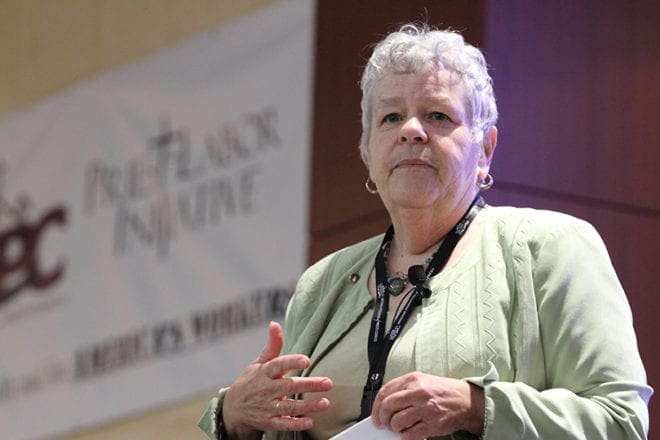Participants on hand for the 46th annual convocation of the National Federation of Priests’ Councils gather for a reception on the terrace level of the Archdiocese of Atlanta Chancery, April 29. Photo By Michael Alexander
Atlanta
Pope Francis’ inspiration impacts agenda for leaders of priests’ councils
By ANDREW NELSON, Staff Writer | Published May 15, 2014
ATLANTA—Longtime Vatican reporter John Allen on Thursday, April 24, spoke to more than 100 priests in Atlanta attending the meeting of the National Federation of Priests’ Councils.
Allen said the global fascination with Pope Francis is an opportunity for the church to engage with the world. But he wondered what type of church the world would see.
Would the world see a “debating society” or a “field hospital in which the wounds of a bruised and hurting humanity are cured”?
Allen said he couldn’t predict which vision of the church will emerge, but the second “by far is the much more attractive missionary and evangelical option.”
On subjects from liturgy and new immigrants to a priest-labor initiative and a perspective on the “Francis effect” at the Vatican, members of the national organization gathered to gain new insights.
Father Anthony Cutcher, a priest of the Archdiocese of Cincinnati who is president of the NFPC board, said while the federation had focused on church issues for the last few years, this meeting was to look beyond church walls. It was inspired by the mandate of Pope Francis, he said.
“Let’s stop looking at our navels and go out,” he said.
The meeting’s theme was “Renewal of the Heart.” The conference wanted to focus on what draws most men to ministry as priests and then added overlapping issues to encompass all parts of the church, Father Cutcher said. Archbishop Wilton D. Gregory talked to the group about the collaboration that should take place between bishops and priests, with mutual respect between both.
Priests also heard from the president of the Mexican American Catholic College in San Antonio, Texas, about Hispanic Catholics.
According to Arturo Chavez, the booming Hispanic population is not yet represented in Catholic Church leadership, while many are switching to evangelical churches. Nearly one out of four people under 18 years old in the United States is Hispanic. And the Hispanic community is developing in more states, challenging church leaders more widely to learn new cultural practices.
That’s valuable information for some priests, said Father Cutcher. There are places where priests have little interaction with Hispanics now, but the community can change quickly.
And it is more than just learning the language. “You have to understand the culture, where are they coming from, what are their values, what are our shared values,” he said.

Dominican Sister Mary Priniski, PhD, speaks to National Federation of Priests’ Councils (NFPC) attendees during the introduction of the priest-labor initiative, April 30. The NFPC intends to train a new breed of “labor priests,” who will advocate on behalf of abused and exploited workers, including those in immigrant communities. Photo By Michael Alexander
Father Dan Wolf, a pastor in Oklahoma City, has lived and worked with international priests nine times. He said that can be an anxiety for some, so he attends the federation meetings to share his experiences.
The organization lets priests take in the wider perspective of what is happening in society that will impact the church, he said.
Atlanta priest Father Rafael Carballo came to hear a discussion about priest-labor relations.
He worked in poultry plants for many years before his ordination. He wanted to learn how relations between the church and the labor movement developed, he said. The collaboration seems to be a well-developed practice in the Northern states, but not here in Georgia, and there may be opportunities in the future to examine that, said Father Carballo, pastor of Our Lady of Perpetual Help Church, Carrollton.
He recalled the 2000 pastoral letter from bishops in the South reflecting on the poultry industry. Plant supervisors at the time asked him why Catholics were raising questions about the industry, he said.
The letter was issued a dozen years ago and those issues remain, from workers without proper authorization to workplace safety and adequate pay for the work, he said. He asked if the church has become “too comfortable with itself and not looking into the workers’ needs.”
On Pope Francis, Allen said Italians called the recent canonization of St. John Paul II and St. John XXIII the “festival of four popes,” counting the pope and retired Pope Benedict XVI. He said the event showed how the church is more than rival camps and “beyond the politics of left versus right.”
For Allen, Pope Francis can be understood if looked at through the lens of mercy. His fundamental theme is to be the “pope of mercy,” Allen said. Each pope Allen has written about had a signature phrase, with St. John Paul’s “Be not afraid,” and Pope Benedict’s “reason and faith,” Allen said.
“We are going to remember this man as the pope of mercy,” he said.
The pope believes the world already knows the church’s judgment so now it must show itself as a “community of mercy,” he said.
The church faces an “evangelizing opportunity” with the world’s fascination with the pope. He has some 12 million Twitter followers and appeared on numerous magazine covers, from Rolling Stone to Time Man of the Year, Allen said.
“The world’s eyes are on him and the church he leads.”